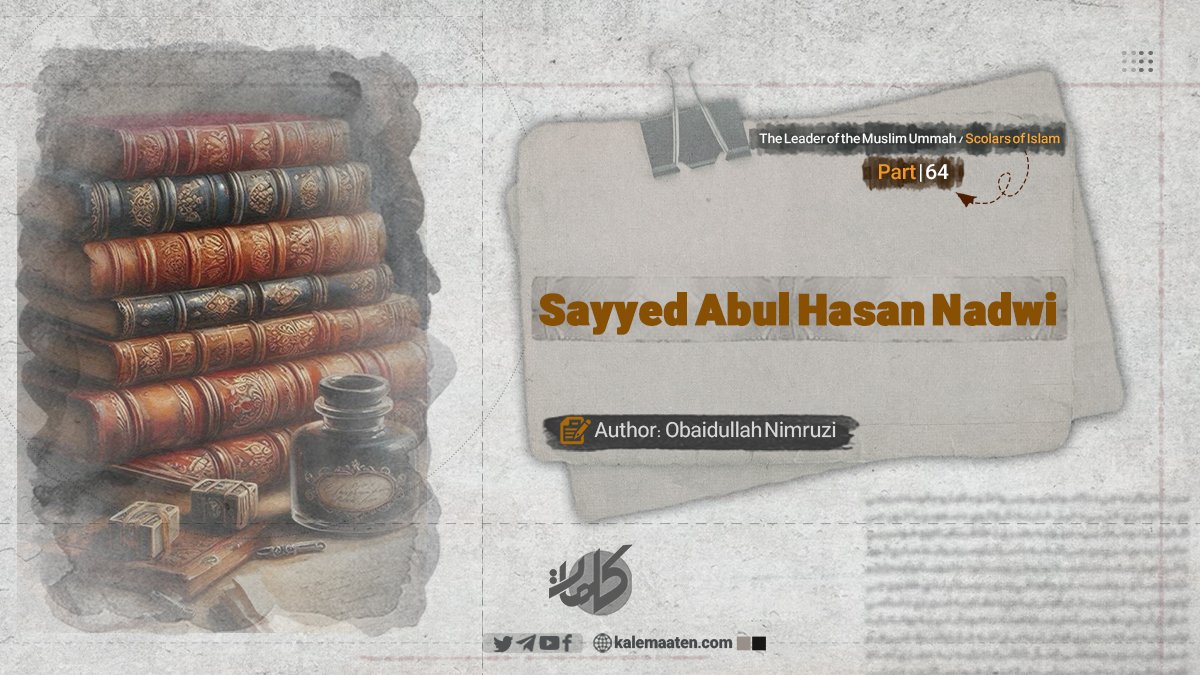Author: Obaidullah Nimruzi
Allama Sayyed Abul Hasan Nadwi ‘May Allah have mercy on him’ (Part 64)
Shaykh al-Arab wal-Ajam, Mawlana Sayyed Husain Ahmad Madani (MAPH)
The relationship—and deep love—between Imam Nadwi and Shaykh al-Arab wal-Ajam, Mawlana Sayyed Husain Ahmad Madani, has a long history. This bond of devotion and reverence began when his elder and esteemed brother, Dr. Sayyed Abdul Ali Nadwi, established a close relationship of admiration and spiritual guidance with Mawlana Madani.
Whenever Mawlana Madani traveled to Lucknow for political gatherings or other meetings, the home of Dr. Abd al-Ali—who was one of his devoted admirers—became his residence. At times, Mawlana Madani would stay there for several days.
During that period, Mawlana Nadwi was still a young child and was tasked with serving and attending to Mawlana Madani’s needs. This was a great blessing for the young boy. Mawlana Nadwi later stated that with the arrival of Mawlana Madani in their home, a special radiance and spiritual atmosphere filled the house, laying the earliest foundations of his spiritual growth. Although he could not fully grasp the depth of Mawlana Madani’s speeches or other virtues due to his young age, the noble personality of Mawlana Madani left such a deep impression on his heart that he felt an instinctive desire to bow at his feet and kiss his hand.
One of the outstanding characteristics of Mawlana Madani was his constant emphasis on simplicity. He always insisted on having plain, unpretentious food, and whenever something more elaborate was prepared, he would express his displeasure.
Mawlana Abd al-Ali Nadwi paid great attention to his younger brother, striving for his academic, practical, physical, and spiritual development. In a letter to Mawlana Madani, he once wrote:
“Please pray that just as Allah took the work of reform and revival from Sayyid Ahmad Shaheed, He may take the same, or even more, from Ali Abul Hasan Nadwi.”
Indeed, these were foundational bricks in shaping the noble personality of Imam Nadwi. His acquaintance with and conversations with Mawlana Madani brought countless blessings into his life, paving the way for his progress in spirituality, truth, purification, and excellence.
Journey to Deoband
In one of the gatherings, Dr. Abd al-Ali brought his younger brother to Mawlana Madani to present his case. After meeting him, Mawlana Madani said, “Send him to Deoband to me.” Thus, in Rabi‘ al-Awwal or Rabi‘ al-Thani of the year 1351 Hijri, Abul Hasan set out for Deoband, where he was met with the immense kindness and affection of Mawlana Madani.
During this time, Abul Hasan requested Mawlana Madani to allocate some time for him to discuss difficult passages in the Quran. Mawlana Madani designated Friday for this purpose, which was a significant privilege for Abul Hasan.
This energetic, hardworking, and enthusiastic young student made the best use of Mawlana Madani’s spiritual and educational gatherings. Anyone who approached such a great and noble Shaykh with high aspirations would undoubtedly consider such moments among the best of his life.
As one of the religious leaders of India’s independence movement, Mawlana Madani was always surrounded by influential religious figures who visited him in large numbers. In his home, various newspapers and journals from different regions would gather, providing a unique opportunity for Abul Hasan. Since he already had an interest in writing and literary activities, this exposure further deepened his engagement with the intellectual world. Moreover, his frequent presence at Mawlana Madani’s home allowed him to become acquainted with many political leaders, sincere freedom fighters, and distinguished scholars of Darul Uloom Deoband.
During this period, Mawlana Madani requested his esteemed colleague, Mawlana Muhammad A‘zaz Ali, to allow Abul Hasan to attend his classes. With great generosity, Mawlana A‘zaz Ali granted permission, and Abul Hasan began attending lessons on Sharh al-Nuqaya by Mulla Ali Qari. He benefited immensely from the academic and spiritual wisdom of this noble scholar.
Mawlana Nadwi later wrote in his blessed memoirs:
“During my stay at Darul Uloom, I read a profound book and studied a living document with various chapters and sections—ranging from religion and ethics to politics. This living, eloquent record had a beautiful title that contained both praise and admiration.”
In summary, Mawlana Nadwi was immersed in a deeply spiritual and enriching environment that played a crucial role in shaping his intellectual, ethical, and spiritual foundation. He sat in the company of noble and distinguished personalities who could truly be regarded as the shining stars of knowledge and spirituality in the Indian subcontinent.
One of these great figures was Mawlana Madani, about whom Allama Iqbal (may Allah have mercy on him) said:
“The secret of our faith, his awareness, his vision—
He is inside our home, yet outside the door.
We are church lovers, we sell mosques,
But he drinks from the goblet of Mustafa’s hand.
The spiritual sapling that grew into a mighty tree…”
Through the companionship of these elite scholars in the field of knowledge and wisdom, the budding spiritual personality of Mawlana Nadwi gradually blossomed and bore fruit. He was not only a distinguished scholar but also a man of action who consistently devoted himself to spiritual worship and self-purification.
Undoubtedly, this special attention to self-discipline and spiritual enhancement was the greatest factor in shaping the esteemed personality of Mawlana Nadwi.
Continues…
[1]. Biography of Islamic Thinkers, page 251.
[2]. Personalities and Books, page 27.



